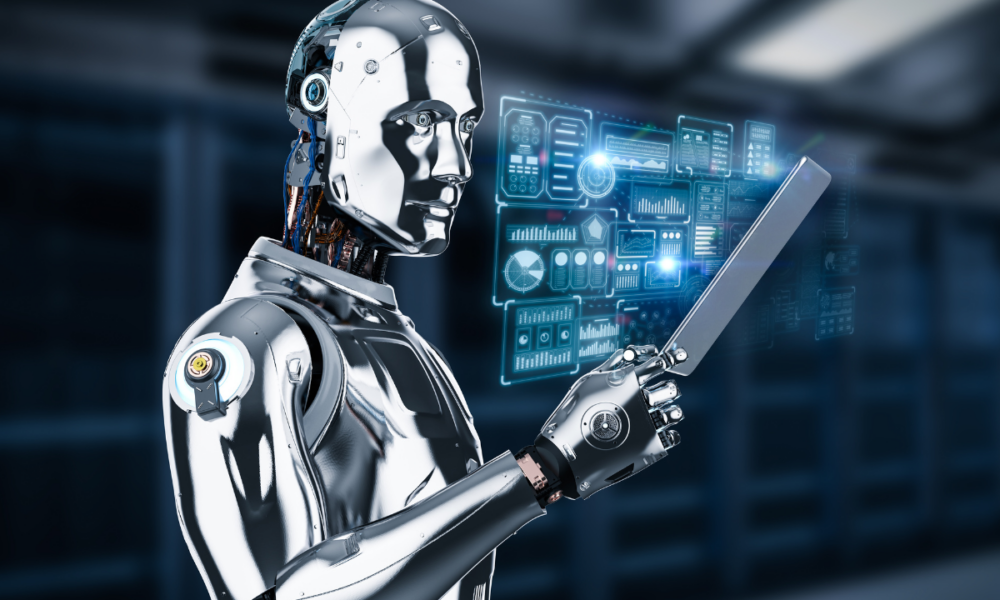AI developing at astonishing pace
To say that the recent rise of AI has been meteoric would be to do something of a disservice to the decades of effort that had previously been invested in developing the technology. However, since ChatGPT launched publicly on 30th November 2022 there has been a pace of development that is nothing short of astonishing.
Since then, AI models have become more sophisticated, demonstrating improved abilities in tasks such as generating creative text, language translation, writing different kinds of creative content, and answering questions informatively.
Researchers have also developed specialised AI models for various sectors where information is complex and technical, including medicine, law, and science. AI is very accessible with user-friendly interfaces and platforms driving uptake for professional and personal use and increasing adoption in various fields, from education to customer service.
Where is AI’s impact on jobs and roles being seen?
Despite this success, regulation and concerns over the impacts of AI on the job market and its implications for society in general continue to loom large. AI is impacting jobs across a broad swathe of sectors and job function types. This includes:
- Data entry – AI-powered tools easily automate data collection, entry, and management, reducing human error and increasing efficiency.
- Customer services – AI chatbots and virtual assistants can handle customer enquiries, solve common issues, and provide 24/7 support without human intervention.
- Manufacturing and assembly – Robotics and AI-powered machines are becoming more capable of handling repetitive tasks on production lines, increasing automation in many manufacturing processes.
- Retail cashiers – AI-driven self-service checkout systems, contactless payments, and automated kiosks are replacing human cashiers.
- Paralegal and legal – AI is increasingly being used in legal research, document analysis, and contract review, reducing the need for human legal assistants.
- OTC banking – Many over-the-counter (OTC) banking services have been automated through AI-driven apps and ATMs.
- Journalists and copywriters – Large-language-model (LLM) AI is good at writing when properly prompted. While they are not replacing creative writers, they are disrupting jobs that revolve around structured or templated content.
- Telemarketing – AI-driven automated calling systems (robocalls) and chatbots are used to reach out to customers, handle inquiries, and follow up on sales leads without human intervention.
- Accountancy and bookkeeping – AI and machine learning automate many bookkeeping tasks, such as invoice management, expense tracking, and tax preparation.
- Medical transcription – AI speech recognition tools transcribe medical notes and other voice recordings far more quickly than humans.
- Warehousing – AI-driven robots and automation systems are increasingly being used in logistics and fulfilment centres for sorting, packing, and shipping.
- Medical diagnostics – AI systems are capable of analysing medical images and making diagnoses in fields such as radiology, often with high accuracy.
- Administration – AI automates many routine administrative tasks such as scheduling meetings, managing emails, and handling basic office communications.
In short, AI excels in tasks that are repetitive, structured, or data-driven. However, jobs that require complex decision-making, creativity, or human interaction remain harder for AI to fully replace.
Many commentators agree that individuals and societies need to adapt to these changes through education, training, and policies that support lifelong learning.
Career consultancy opportunities for recruiters
Recruiters are in a pivotal position and may be able to play a crucial role in helping people whose careers are being disrupted by AI advancements.
As AI continues to reshape the job market, recruitment businesses have a unique opportunity to provide invaluable support to individuals facing career disruption.
Recruiters might wish to consider expanding services to include career consultancy as a service. In response to the current wave of disruption, helping candidates navigate the complexities of the AI-driven jobs market offers a compelling message.
Here are some key elements that might form part of an agency’s career consultancy offer:
- Conduct a needs assessment – Identify the specific needs of your candidates in relation to AI-driven job disruption. This may involve 1-2-1 interviews, conducting online surveys, or focus group sessions.
- Tailor the service offering – Based on the needs assessment, create a tailored package of career consultancy services. Consider offering personalised assessments, career counselling, CV, resume and cover letter writing, interview preparation, networking strategies, and more.
- Identify transferable skills – Transferable skills that can be applied in other industries or roles are often the key to transitioning into new career pathways. Consider identifying these skills and matching candidates with jobs in emerging sectors.
- Offer upskilling and reskilling guidance – Recruiters may be able to help workers impacted by AI with resources for upskilling or reskilling or gaining specific certifications or credentials in areas where AI is less likely to replace jobs.
- Focus on growth sectors – AI and automation are creating opportunities in technology fields like AI development, cybersecurity, cloud computing, and green technologies. Helping workers connect with growth sectors so they can pivot into these growing industries would be seen as a great benefit.
- Focus on roles that humans do better – AI is not suited to roles requiring empathy, creativity, and complex decision-making. Recruiters might consider assisting disrupted candidates transition into jobs like social work, therapy, education, and creative industries where human interaction is key.
- Soft skills development – As AI excels at technical or repetitive tasks, recruiters might consider encouraging workers to develop essential soft skills. Emotional intelligence, leadership, and adaptability are highly desirable attributes.
- Build partnerships – Forge relationships by collaborating with educational institutions, trade associations, and other organisations to expand agency reach and offer a comprehensive set of resources to candidates.
- Prepare candidates for specific clients – Explore the possibility of helping to prepare candidates to meet the needs of existing clients by developing reskilling and upskilling pathways.
- Hire or train specialist agency team members – Consider boosting the expertise within your agency by training existing team members or hiring experienced career advisors to lead the delivery of career consultancy services.
- Leverage technology – Of course, like many recent developments that have disrupted the jobs market, AI is the main driver now. Don’t ignore opportunities to use AI-powered tools and platforms to enhance the career consultancy services your agency may wish to provide.
AI is undoubtedly highly disruptive, however, technological change often creates winners and losers. Help your recruitment business to exploit the opportunity by focusing on the services that candidates need to prevent their careers from sliding and to help them come out on the winning side.
Get a smarter recruitment back-office with ETZ
ETZ’s leading recruitment back office software solution streamlines the back office processing of your recruitment agency. Our complementary solutions to our leading timesheet and invoicing solution, are ETZ Comply for onboarding and document management, and Caspian for business intelligence. These give agencies further capability to streamline and uncover opportunities.
To find out more call us on 0800 311 2266 or book a demo.





